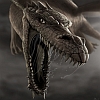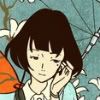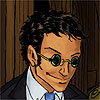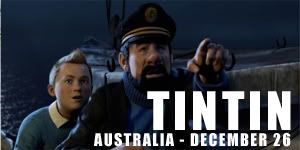What Movies are you Watching?
The live-action Rurouni Kenshin movie came out today in Japan, and it was awesome. I have only seen the Trust and Betrayal OVAs and a couple of episodes of the TV series, but based on the little I know the casting was excellent (this is confirmed by my friend who has seen and read the original story), and (also according to my friend) the plot very successfully wove together stories that were originally several separate story arcs. Kenshin, Kaoru, Yahiko, Sanosuke, Megumi, Saito, and (I think) Shishio all make appearances, as well as a ninja whose name I didn’t catch. There was also a very well-done tribute to Trust and Betrayal in which we got to see Tomoe and her original fiancé: naturally, the movie didn’t spend terribly long on it, but it was an appropriate length for that sort flashback and it was integrated well with the rest of the story. Another thing that my friend and I both liked was the way that Kenshin’s personality was handled. Anyone who is familiar with both the OVAs and the TV/manga knows how huge the difference is between the serious, grim, angst-ridden Kenshin from Trust and Betrayal and the sunny, goofy Kenshin of the TV series. The movie struck a great balance between the two—and made it believable—by giving Kenshin a personality that was fairly quiet much of the time, but easygoing and with some moments of goofiness. It’s hard to explain it verbally, but it came across well and was very effective at reconciling those extremes (OVA vs. TV) in a believable way.
The action scenes were done with mostly very close-up shots, which was not quite to my taste, but I’m told that that is faithful to the source. The settings were beautiful, and I really enjoyed getting to see the lush historical detail of early Meiji-era Japan. There were a couple of pieces in the soundtrack that repeated slightly too frequently, but other than that the music was pretty good.
Looking forward to seeing this movie a second time after it gets a North American release; mainly I want to see it subbed because I wasn’t able to understand all of the Japanese dialogue, but the movie was good enough that I would definitely not mind watching it again.
The action scenes were done with mostly very close-up shots, which was not quite to my taste, but I’m told that that is faithful to the source. The settings were beautiful, and I really enjoyed getting to see the lush historical detail of early Meiji-era Japan. There were a couple of pieces in the soundtrack that repeated slightly too frequently, but other than that the music was pretty good.
Looking forward to seeing this movie a second time after it gets a North American release; mainly I want to see it subbed because I wasn’t able to understand all of the Japanese dialogue, but the movie was good enough that I would definitely not mind watching it again.
Let others believe in the God who brings men to trial and judges them. I shall cling to the God who resurrects the dead.
-St. Nikolai Velimirovich
MAL
-St. Nikolai Velimirovich
MAL
-

Kaori - Posts: 1463
- Joined: Wed Dec 22, 2004 4:48 pm
- Location: 一羽の鳥が弧を描いてゆく
Watched The Killers, I liked it, the ending was a bit lame, but it was still a pretty nice romcom.
Also saw with my brother Galaxy of Terror... (I thought he said it was called Galaxy of Terra, so I thought it was some corny 80s scifi movie, I like those...) Um, I hated it? I didn't mean to even watch it, I didn't know it was even horror until the end of the movie, when I told my sister I watched it and she was like 'But, sis, you hate horror movies! Why did you watch it?!' I was like 'oh, that explains all the gruesome deaths and creepy monster crap.' She just rolled her eyes and said I was a ditz, which I guess I kind of am. Considering I didn't realize it was horror, even after a giant worm eats the hot blonde lady and then spits her out, naked. -_- Yeaaah, I should have noticed by then. Not to mention the final death, which was the only other girl, getting squeezed to death, so that all her guts and other fillings slowly spill out as she screams...
(I looked away quite a lot.)
Did I mention I'm stupid?
Also saw with my brother Galaxy of Terror... (I thought he said it was called Galaxy of Terra, so I thought it was some corny 80s scifi movie, I like those...) Um, I hated it? I didn't mean to even watch it, I didn't know it was even horror until the end of the movie, when I told my sister I watched it and she was like 'But, sis, you hate horror movies! Why did you watch it?!' I was like 'oh, that explains all the gruesome deaths and creepy monster crap.' She just rolled her eyes and said I was a ditz, which I guess I kind of am. Considering I didn't realize it was horror, even after a giant worm eats the hot blonde lady and then spits her out, naked. -_- Yeaaah, I should have noticed by then. Not to mention the final death, which was the only other girl, getting squeezed to death, so that all her guts and other fillings slowly spill out as she screams...
(I looked away quite a lot.)
Did I mention I'm stupid?


The Lord is my shepherd, I shall not want. He makes me lie down in green pastures; He leads me beside quiet waters. He restores my soul; He guides me in paths of righteousness For His name's sake. Even though I walk though the valley of the shadow of death, I will fear no evil; for thou art with me; Thy rod and Thy staff, they comfort me. Thou dost prepare a table before me in the presence of my enemies; Thou hast anointed my head with oil; My cup overflows. Surely goodness and lovingkindness will follow me all the days of my life, and I will dwell in the house of the Lord forever. Psalm 23
-

AngelicTotoro - Posts: 338
- Joined: Mon Aug 10, 2009 4:21 pm
- Location: My home, The Camphor Tree.
Can't Buy Me Love (1987) - Predictable but entertaining. The start of the movie was weak but it turned out far more enjoyable than I expected.
Mission to Mars (1996) - I saw this as a kid but I almost completely forgot it. It's interesting, but there's a reason it kind of faded into obscurity shortly after its release. It's not fantastic. Additionally, it probably has the most distracting score I have EVER heard in a movie. Somebody wanted to go all Gershwin with their film score and it's just incredibly distracting and unsettling. It kind of fits with the unsettling tone of the movie but there's way too much dead space that gets filled up bizarre score and it just doesn't work well.
Mission to Mars (1996) - I saw this as a kid but I almost completely forgot it. It's interesting, but there's a reason it kind of faded into obscurity shortly after its release. It's not fantastic. Additionally, it probably has the most distracting score I have EVER heard in a movie. Somebody wanted to go all Gershwin with their film score and it's just incredibly distracting and unsettling. It kind of fits with the unsettling tone of the movie but there's way too much dead space that gets filled up bizarre score and it just doesn't work well.
-

Yuki-Anne - Posts: 1637
- Joined: Thu Aug 10, 2006 10:33 am
- Location: Japan
"Sergeant York" (1941) with Gary Cooper AMAZING MOVIE especially if you are a christian!
[color="Pink"]It can't rain all the time[/color]
-

HarleyQuinnOy - Posts: 70
- Joined: Mon Jul 30, 2012 3:08 am
- Location: Destiny Island
Alex Rider: Operation Stormbreaker - An okay action flick, basically the slightly-better British version of Agent Cody Banks, with added bonuses of familiar actors sprinkled throughout (really wish Ewan McGregor got more screen time, since that was primarily the reason I checked it out)
Terminator: Salvation - Every Terminator movie ought to have Christian Bale in it But yeah, this was a good action movie, fairly exciting, and I enjoyed it fairly well.
But yeah, this was a good action movie, fairly exciting, and I enjoyed it fairly well.
Then I rewatched Equilibrium and Pitch Black with my roommate, who hadn't seen either yet. Loooove those movies <3
Terminator: Salvation - Every Terminator movie ought to have Christian Bale in it
 But yeah, this was a good action movie, fairly exciting, and I enjoyed it fairly well.
But yeah, this was a good action movie, fairly exciting, and I enjoyed it fairly well.
Then I rewatched Equilibrium and Pitch Black with my roommate, who hadn't seen either yet. Loooove those movies <3
You can find out things about the past that you never knew. And from what you've learned, you may see some things differently in the present. You're the one that changes. Not the past.
- Ellone, Final Fantasy VIII

"There's a difference between maliciously offending somebody - on purpose - and somebody being offended by...truth. If you're offended by the truth, that's your problem. I have no obligation to not offend you if I'm speaking the truth. The truth is supposed to offend you; that's how you know you don't got it."
- Brad Stine
- Ellone, Final Fantasy VIII

"There's a difference between maliciously offending somebody - on purpose - and somebody being offended by...truth. If you're offended by the truth, that's your problem. I have no obligation to not offend you if I'm speaking the truth. The truth is supposed to offend you; that's how you know you don't got it."
- Brad Stine
-

the_wolfs_howl - Posts: 3273
- Joined: Thu Mar 01, 2007 11:26 pm
- Location: Not Paradise...yet
the_wolfs_howl (post: 1586678) wrote:Alex Rider: Operation Stormbreaker - An okay action flick, basically the slightly-better British version of Agent Cody Banks, with added bonuses of familiar actors sprinkled throughout (really wish Ewan McGregor got more screen time, since that was primarily the reason I checked it out)
Terminator: Salvation - Every Terminator movie ought to have Christian Bale in itBut yeah, this was a good action movie, fairly exciting, and I enjoyed it fairly well.
Then I rewatched Equilibrium and Pitch Black with my roommate, who hadn't seen either yet. Loooove those movies <3
ahhh
 Equilibrium and Pitch Black probably two of my most watched movies they never get old, Great choices, I have forced my few good friends to watch them!
Equilibrium and Pitch Black probably two of my most watched movies they never get old, Great choices, I have forced my few good friends to watch them![color="Pink"]It can't rain all the time[/color]
-

HarleyQuinnOy - Posts: 70
- Joined: Mon Jul 30, 2012 3:08 am
- Location: Destiny Island
-

Warrior 4 Jesus - Posts: 4844
- Joined: Tue Sep 07, 2004 10:52 pm
- Location: The driest continent that isn't Antarctica.
-

Atria35 - Posts: 6295
- Joined: Sat Mar 20, 2010 7:30 am
Watched The Pirates! Band of Misfits Not the best Aardman film, but better than most of the stuff out there.
MAL - CAA MAL club - Avatar from Hyouka
"DaughterOfZion 06:19 - forget love, fudge conquers all. xD"
"Written assignments are never finished, only due." -me
-Speak not unless you can improve the silence.-
MOES: Members Observing Efficient Sigs
"DaughterOfZion 06:19 - forget love, fudge conquers all. xD"
"Written assignments are never finished, only due." -me
-Speak not unless you can improve the silence.-
MOES: Members Observing Efficient Sigs
-

MomentOfInertia - Posts: 1316
- Joined: Tue May 25, 2010 7:21 pm
- Location: Around
Rewatched the first X-Men movie 

You can find out things about the past that you never knew. And from what you've learned, you may see some things differently in the present. You're the one that changes. Not the past.
- Ellone, Final Fantasy VIII

"There's a difference between maliciously offending somebody - on purpose - and somebody being offended by...truth. If you're offended by the truth, that's your problem. I have no obligation to not offend you if I'm speaking the truth. The truth is supposed to offend you; that's how you know you don't got it."
- Brad Stine
- Ellone, Final Fantasy VIII

"There's a difference between maliciously offending somebody - on purpose - and somebody being offended by...truth. If you're offended by the truth, that's your problem. I have no obligation to not offend you if I'm speaking the truth. The truth is supposed to offend you; that's how you know you don't got it."
- Brad Stine
-

the_wolfs_howl - Posts: 3273
- Joined: Thu Mar 01, 2007 11:26 pm
- Location: Not Paradise...yet
Saw Drive last night. After the whole, "BRYAN CRANSTON AND RON PERLMAN IN A MOVIE TOGETHER?? WHY DIDN'T I SEE THIS SOONER!?" died down I...kind of didn't like it. I mean, it was a well made movie, a lot of parts were really beautiful, the camerawork and use of music was great...but it just felt so silly to me. Like, the main character hardly ever speaks, which would be fine but he has this stupid grin on his face almost the entire time. Add to that his awkward long silences when anyone talks to him and he just comes across as...hollow. I think that was the main problem with the movie, it had this empty feel to it underneath all the style. AND THEN THE VIOLENCE. It comes out of nowhere, adds nothing to the film, and is incredibly jarring. Zombies have less gruesome deaths than the characters in that movie.
I'm glad I watched it, just the parts I liked were good enough to make it worth it--but I doubt I will ever watch it again.
I'm glad I watched it, just the parts I liked were good enough to make it worth it--but I doubt I will ever watch it again.
"Sometimes isolation is a good thing, Razputin. It can lead to many important discoveries."
--Sasha Nein, Psychonauts
--Sasha Nein, Psychonauts
-

Popyman - Posts: 184
- Joined: Tue Sep 20, 2011 8:21 pm
- Location: NC
Watched "Flight of the Navigator" the other night with my wife. It was a monumental movie for Computer graphics, because it was the first to use reflection mapping. Considering the CG was so impressive, it's hilarious to see the STRINGS hanging off the puppets in a couple shots. They were better at the new tech than they were at the old tech. At least there wasn't much compositing (except of the CG ship over the non-CG background, which is a lot easier than doing the reverse)
I loved reading the credits, and how they changed Paul Reuben's name because that was likely right around the time he had his scandal, and Disney didn't want parents to protest. Anyone who ever watched Pee Wee's playhouse knew it was him. Just like most people knew Pauly Shore was Bobby in a Goofy Movie (though I wasn't sure about that one until just now... he's not listed on IMDB, which is annoying. IMDb has gotten pathetic lately)
I loved reading the credits, and how they changed Paul Reuben's name because that was likely right around the time he had his scandal, and Disney didn't want parents to protest. Anyone who ever watched Pee Wee's playhouse knew it was him. Just like most people knew Pauly Shore was Bobby in a Goofy Movie (though I wasn't sure about that one until just now... he's not listed on IMDB, which is annoying. IMDb has gotten pathetic lately)
https://www.youtube.com/watch?v=evcNPfZlrZs Watch this movie なう。 It's legal, free... And it's more than its premise. It's not saying Fast Food is good food. Just watch it.
Legend of Crying Bronies: Twilight's a Princess

Legend of Crying Bronies: Twilight's a Princess

-

Bobtheduck - Posts: 5867
- Joined: Mon Aug 25, 2003 9:00 am
- Location: Japan, currently. Gonna be Idaho, soon.
Re-watched Megamind and Alien. Two very different movies, but both very, very good.
You can find out things about the past that you never knew. And from what you've learned, you may see some things differently in the present. You're the one that changes. Not the past.
- Ellone, Final Fantasy VIII

"There's a difference between maliciously offending somebody - on purpose - and somebody being offended by...truth. If you're offended by the truth, that's your problem. I have no obligation to not offend you if I'm speaking the truth. The truth is supposed to offend you; that's how you know you don't got it."
- Brad Stine
- Ellone, Final Fantasy VIII

"There's a difference between maliciously offending somebody - on purpose - and somebody being offended by...truth. If you're offended by the truth, that's your problem. I have no obligation to not offend you if I'm speaking the truth. The truth is supposed to offend you; that's how you know you don't got it."
- Brad Stine
-

the_wolfs_howl - Posts: 3273
- Joined: Thu Mar 01, 2007 11:26 pm
- Location: Not Paradise...yet
Various animated movies such as: Lilo and Stitch, Mulan, Tarzan, Atlantis, etc. Hoping it's just a phase because you can only watch these movies so many times before you begin to hum the songs in school.
[font="Comic Sans MS"][SIZE="5"][color="Magenta"]I can do all thing through Christ...[/color][/SIZE][/font]:thumb:
[font="Comic Sans MS"][SIZE="4"][color="Magenta"]"A person who never made a mistake never tried anything new." ~ Albert Einstein[/color][/SIZE][/font]:rock:
[font="Comic Sans MS"][SIZE="5"][color="Magenta"]"I will protect my ninja way!" ~ Rock Lee[/color][/SIZE][/font]:dance:
[font="Comic Sans MS"][SIZE="4"][color="Magenta"]I dream of a better world where chickens can cross the road without having their motives questioned.[/color][/SIZE][/font]
[font="Comic Sans MS"][SIZE="4"][color="Magenta"]"A person who never made a mistake never tried anything new." ~ Albert Einstein[/color][/SIZE][/font]:rock:
[font="Comic Sans MS"][SIZE="5"][color="Magenta"]"I will protect my ninja way!" ~ Rock Lee[/color][/SIZE][/font]:dance:
[font="Comic Sans MS"][SIZE="4"][color="Magenta"]I dream of a better world where chickens can cross the road without having their motives questioned.[/color][/SIZE][/font]
-

Kala13 - Posts: 8
- Joined: Sun Mar 25, 2012 4:47 pm
- Location: Texas
I get to watch X-men II tonight. I'm just a sucker for X-Men movies, but you have to admit they are seriously good sometimes.
"I tell you, if they keep quiet, the stones will cry out." (Luke 19:37-40).
Exceptionally Ordinary
"No one ever made a difference by being like everyone else." P.T.Barnam
Exceptionally Ordinary
"No one ever made a difference by being like everyone else." P.T.Barnam
-

SierraLea - Posts: 1255
- Joined: Sat Mar 10, 2012 7:57 am
- Location: the epitome of laugher
SierraLea (post: 1588297) wrote:I get to watch X-men II tonight. I'm just a sucker for X-Men movies, but you have to admit they are seriously good sometimes.
One and two are a lot of fun, but i have some really weird nightmares at times that they tried to make a third one and also a prequel focusing on Wolverine with a awful Deadpool. Good thing the only prequel is first class hate to think those nightmare are real

Follow and suggest movies.
Lightscameracritics.wordpress.com
Now running the 15 days of halloween.
Lightscameracritics.wordpress.com
Now running the 15 days of halloween.
-

GrubbTheFragger - Posts: 3940
- Joined: Sat Jun 25, 2005 12:00 pm
- Location: Colorado Springs , CO
I saw a couple of movies this weekend and last.
The Other Guys - Pretty funny actually, Will Ferrel hasn't made anything good since Stranger then Fiction, so I wasn't expecting much, but Mark Wahlberg was so very awesome in this movie, and the two of them had really great chemistry in each scene together. I liked it.
(The part where the building explodes and blows them backwards = crazy hilarious)
Kate and Leopold - I really liked this one, it's actually one of my oldest brother's favorite movies. (I can see why now that I've finally watched it.) It was such a sweet, funny film. The only real problem I have with it, is that it gives girls unrealistic expectations of men. (Even though they really should still act like Leopold to a certain degree.) So I guess that means that I don't have a problem, doesn't it?
(Also saw GITS: SSS, I spoke of that in the anime thead though.)
The Other Guys - Pretty funny actually, Will Ferrel hasn't made anything good since Stranger then Fiction, so I wasn't expecting much, but Mark Wahlberg was so very awesome in this movie, and the two of them had really great chemistry in each scene together. I liked it.
(The part where the building explodes and blows them backwards = crazy hilarious)
Kate and Leopold - I really liked this one, it's actually one of my oldest brother's favorite movies. (I can see why now that I've finally watched it.) It was such a sweet, funny film. The only real problem I have with it, is that it gives girls unrealistic expectations of men. (Even though they really should still act like Leopold to a certain degree.) So I guess that means that I don't have a problem, doesn't it?
(Also saw GITS: SSS, I spoke of that in the anime thead though.)

The Lord is my shepherd, I shall not want. He makes me lie down in green pastures; He leads me beside quiet waters. He restores my soul; He guides me in paths of righteousness For His name's sake. Even though I walk though the valley of the shadow of death, I will fear no evil; for thou art with me; Thy rod and Thy staff, they comfort me. Thou dost prepare a table before me in the presence of my enemies; Thou hast anointed my head with oil; My cup overflows. Surely goodness and lovingkindness will follow me all the days of my life, and I will dwell in the house of the Lord forever. Psalm 23
-

AngelicTotoro - Posts: 338
- Joined: Mon Aug 10, 2009 4:21 pm
- Location: My home, The Camphor Tree.
GrubbTheFragger (post: 1588344) wrote:One and two are a lot of fun, but i have some really weird nightmares at times that they tried to make a third one and also a prequel focusing on Wolverine with a awful Deadpool. Good thing the only prequel is first class hate to think those nightmare are real
I happen to like the prequel about wolverine, but first class was an absolute awesome movie.
"I tell you, if they keep quiet, the stones will cry out." (Luke 19:37-40).
Exceptionally Ordinary
"No one ever made a difference by being like everyone else." P.T.Barnam
Exceptionally Ordinary
"No one ever made a difference by being like everyone else." P.T.Barnam
-

SierraLea - Posts: 1255
- Joined: Sat Mar 10, 2012 7:57 am
- Location: the epitome of laugher
-

Shao Feng-Li - Posts: 5187
- Joined: Sun Oct 12, 2003 12:00 pm
- Location: Idaho
Just finished watching Guillermo del Toro's The Devil's Backbone I liked it very much, [spoiler]the people who drop of Carlos never tell him That his father died in the war, but aside from that he movie had me tense throughout with Santi providing most of the scares. On to the two characters I just hated Jacinto the psychopath for what he did to Santi, I mean trowing him into that little pool come on! I'm glad Santi drowned his ***. I also hated the way he killed his girlfriend .Carmen the head if the orphanage wasn't on favorites list either but that's mostly for cheating on the old doctor Casares. [/spoiler]
Overall the movie was great.
Overall the movie was great.
-

Neane - Posts: 1996
- Joined: Fri Jul 22, 2011 5:12 pm
- Location: Candlekeep, Faerûn
leoparker (post: 1588069) wrote:Hello everyone,
My name is Leo Parker. This time i watching "Braveheart" movie. this movie are so good.
Thank`s
Good Choice! I love Braveheart it really is an amazing movie!!
[color="Pink"]It can't rain all the time[/color]
-

HarleyQuinnOy - Posts: 70
- Joined: Mon Jul 30, 2012 3:08 am
- Location: Destiny Island
I watched the 2011 Fright Night and enjoyed it far more than I expected to.
Also watched S.W.A.T., which I also enjoyed far more than I expected to.
Contact was a waste of time; the focus should have been on aliens, but it was way too preachy about the science/religion debate and consequently came off as a transparent message film. Very obnoxious.
Also watched S.W.A.T., which I also enjoyed far more than I expected to.
Contact was a waste of time; the focus should have been on aliens, but it was way too preachy about the science/religion debate and consequently came off as a transparent message film. Very obnoxious.
-

Yuki-Anne - Posts: 1637
- Joined: Thu Aug 10, 2006 10:33 am
- Location: Japan
Just watched Au hasard Baltasar , I give it a 10 out of 10.
Jean-Luc Godard called Au hasard Balthazar “the entire world in 90 minutes”. The reduction is appropriate for a film in which its director, Robert Bresson, has managed to reduce everything - image, sound, plot, character, narrative, etc. - to its bare, poetic essentials. But like most attempts at reduction it seems to exclude all of the wondrous details that goes in to making Au hasard Balthazar one of the most profound, transcendent, spiritual, and moving works of art ever made.
“The entire world in 90 minutes” might not be the first criticism that would pop into someone’s head if you attempted to similarly reduce the plot. In fact, it’s possible to reduce Balthazar’s plot to “the life and death of a donkey”. There’s certainly more to it than that, but I bet Bresson would appreciate the minimalistic brevity. More elaborately, the plot seems to parallel the lives of a donkey named Balthazar and a girl named Marie (Anne Wiazemsky). At an early age, Marie is best friends with a boy named Jacques, and the two christen and raise Balthazar as a pet. Balthazar is destined to become the property of many owners, most of which are hard and cruel on him. But it seems that Balthazar’s and Marie’s lives keep intertwining at important moments, and for the majority of the film we get to see her life (and the lives of others) through his benign gaze.
While Balthazar may be the film’s anchor, there are times in which the plot will move away from him, but these instances always seem fractured and elliptical. We are constantly thrusted in media res into stories and conflicts that we’re destined to only catch glimpses of. The film never attempts to conclusively resolve them, and instead we always end up back with Balthazar. The result is a kaleidoscopic film, told with an exquisitely crafted minimalism that seems as small an intimate as it does majestic and expansive.
The mastermind behind all of this is one of France’s greatest masters, Robert Bresson. Bresson was always a director out of time. He wasn’t apart of France’s old school, but he certainly wasn’t a part of its new wave, either. Throughout his career he forged one of the most idiosyncratic and impressive styles of any director, and as a result he was appreciated, and even revered, by members of the old guard and the new guard. For my money, Balthazar is his best film, perhaps because it distills all of the strengths of his cinema into its purest expression, one that, at its best, manages to be overwhelmingly moving.
Bresson always called his films models, and in no other film has he managed to abstract the human element more than here. When Balthazar is on screen he almost always forms the axis on which the camera revolves, and when humans do take up the focus, Bresson seems much more interested in their hands and feet than their faces and expressions. Of course, Bresson’s fascination with feet and hands is something to be found in all his cinema, but here perhaps more than anywhere else he seems to be able to reduce mankind down to its movement, actions, and choices by way of their hands and feet. Bresson manages to use this focus for every purpose imaginable; sometimes it serves to telescope the drama by narrowing it down to the most crucial detail, other times its used to present a delicate gentility.
Balthazar also displays Bresson’s mastery of music and sound. For music Bresson primarily uses Schubert’s Piano Sonata no. 20; a deceptively simple and melancholy piece of music that, like Bresson’s film, uses a single anchored phrase motif in which all of the later developments work from. It’s hard to imagine a more fitting piece of music to accompany the film emotionally, tonally, or thematically. Bresson has always been a master at manipulating natural sound. The brilliance of Balthazar’s sound design is that, much like the rest of the film, it’s entirely culled from nature, but then simply orchestrated, composed, and edited to its utmost efficacy within any given scene.
Bresson was often described as a painter of films, but watching Balthazar it seems more accurate to say that he was a painter of nature on film. Balthazar is one of the most organically rich films I can think of. It has a rustic simplicity that feels authentic from the first frame to the last. Just like the music and sound, it seems less like Bresson is manipulating and more like he’s orchestrating what’s already there. With the eye of a painter he merely focuses our own gaze on the details of the natural world that we so easily past by without looking twice at.
It almost seems crude, though, to focus so much on the technical achievements of a film whose greatest value perhaps lies in its emotional and thematic substance. Balthazar has often been called an allegory or a religious fable, but the truth is that it feels more like a fable stripped of dictated meaning and intent. While Bresson was indeed a Catholic, and it’s easy to see the film from a Christian angle (the donkey himself is named after one of the Magi, afterall), the film’s greatest impact comes from its universal observance of suffering and tolerance. In fact, it’s easy to read in Balthazar a kind of natural embodiment of the Seven Virtues: Chastity, Temperance, Charity, Diligence, Patience, Kindness, and Humility - as one of his owners says (paraphrased), “You are destined to see the endless follies of man”.
The ultimate genius of the film is that Bresson has managed to capture man at its most humane and inhumane through the eyes of an animal who is completely benevolent, and our eternal sympathies lay with Balthazar rather than the circus line of foolish and cruel humans who surround him. Only an artistic genius like Bresson would’ve been able to see the best and most abstract qualities of man embodied in a donkey. But if the entire film is an exercise in an understated humility and poise, it’s truly the ending where Balthazar achieves one of cinema’s deepest expressions of pathos, in all its genuine sadness and paradoxically uplifting grace. It’s truly a scene in which all but the most hardened hearts are guaranteed to shed a tear.
Au hasard Balthazar is one of those films that you watch and it makes you realize how pedestrian the vast majority of cinema is as a whole. It's a film in which emotion accumulates by subtle strings of suggestion, in all its smallest and grandest mysteries, in all its silence and sound, in every corner of every frame, in every ellipsis that connects and relates by the most minute of inferences… Au hasard Balthazar, in many ways, eludes reductionism as much as it invites it. It’s a miraculous, paradoxical film where so much is contained in so little, and where the smallest gestures provoke the grandest of thoughts and feelings. Above all, it’s perhaps the greatest work from one of cinema’s foremost artists.
Jean-Luc Godard called Au hasard Balthazar “the entire world in 90 minutes”. The reduction is appropriate for a film in which its director, Robert Bresson, has managed to reduce everything - image, sound, plot, character, narrative, etc. - to its bare, poetic essentials. But like most attempts at reduction it seems to exclude all of the wondrous details that goes in to making Au hasard Balthazar one of the most profound, transcendent, spiritual, and moving works of art ever made.
“The entire world in 90 minutes” might not be the first criticism that would pop into someone’s head if you attempted to similarly reduce the plot. In fact, it’s possible to reduce Balthazar’s plot to “the life and death of a donkey”. There’s certainly more to it than that, but I bet Bresson would appreciate the minimalistic brevity. More elaborately, the plot seems to parallel the lives of a donkey named Balthazar and a girl named Marie (Anne Wiazemsky). At an early age, Marie is best friends with a boy named Jacques, and the two christen and raise Balthazar as a pet. Balthazar is destined to become the property of many owners, most of which are hard and cruel on him. But it seems that Balthazar’s and Marie’s lives keep intertwining at important moments, and for the majority of the film we get to see her life (and the lives of others) through his benign gaze.
While Balthazar may be the film’s anchor, there are times in which the plot will move away from him, but these instances always seem fractured and elliptical. We are constantly thrusted in media res into stories and conflicts that we’re destined to only catch glimpses of. The film never attempts to conclusively resolve them, and instead we always end up back with Balthazar. The result is a kaleidoscopic film, told with an exquisitely crafted minimalism that seems as small an intimate as it does majestic and expansive.
The mastermind behind all of this is one of France’s greatest masters, Robert Bresson. Bresson was always a director out of time. He wasn’t apart of France’s old school, but he certainly wasn’t a part of its new wave, either. Throughout his career he forged one of the most idiosyncratic and impressive styles of any director, and as a result he was appreciated, and even revered, by members of the old guard and the new guard. For my money, Balthazar is his best film, perhaps because it distills all of the strengths of his cinema into its purest expression, one that, at its best, manages to be overwhelmingly moving.
Bresson always called his films models, and in no other film has he managed to abstract the human element more than here. When Balthazar is on screen he almost always forms the axis on which the camera revolves, and when humans do take up the focus, Bresson seems much more interested in their hands and feet than their faces and expressions. Of course, Bresson’s fascination with feet and hands is something to be found in all his cinema, but here perhaps more than anywhere else he seems to be able to reduce mankind down to its movement, actions, and choices by way of their hands and feet. Bresson manages to use this focus for every purpose imaginable; sometimes it serves to telescope the drama by narrowing it down to the most crucial detail, other times its used to present a delicate gentility.
Balthazar also displays Bresson’s mastery of music and sound. For music Bresson primarily uses Schubert’s Piano Sonata no. 20; a deceptively simple and melancholy piece of music that, like Bresson’s film, uses a single anchored phrase motif in which all of the later developments work from. It’s hard to imagine a more fitting piece of music to accompany the film emotionally, tonally, or thematically. Bresson has always been a master at manipulating natural sound. The brilliance of Balthazar’s sound design is that, much like the rest of the film, it’s entirely culled from nature, but then simply orchestrated, composed, and edited to its utmost efficacy within any given scene.
Bresson was often described as a painter of films, but watching Balthazar it seems more accurate to say that he was a painter of nature on film. Balthazar is one of the most organically rich films I can think of. It has a rustic simplicity that feels authentic from the first frame to the last. Just like the music and sound, it seems less like Bresson is manipulating and more like he’s orchestrating what’s already there. With the eye of a painter he merely focuses our own gaze on the details of the natural world that we so easily past by without looking twice at.
It almost seems crude, though, to focus so much on the technical achievements of a film whose greatest value perhaps lies in its emotional and thematic substance. Balthazar has often been called an allegory or a religious fable, but the truth is that it feels more like a fable stripped of dictated meaning and intent. While Bresson was indeed a Catholic, and it’s easy to see the film from a Christian angle (the donkey himself is named after one of the Magi, afterall), the film’s greatest impact comes from its universal observance of suffering and tolerance. In fact, it’s easy to read in Balthazar a kind of natural embodiment of the Seven Virtues: Chastity, Temperance, Charity, Diligence, Patience, Kindness, and Humility - as one of his owners says (paraphrased), “You are destined to see the endless follies of man”.
The ultimate genius of the film is that Bresson has managed to capture man at its most humane and inhumane through the eyes of an animal who is completely benevolent, and our eternal sympathies lay with Balthazar rather than the circus line of foolish and cruel humans who surround him. Only an artistic genius like Bresson would’ve been able to see the best and most abstract qualities of man embodied in a donkey. But if the entire film is an exercise in an understated humility and poise, it’s truly the ending where Balthazar achieves one of cinema’s deepest expressions of pathos, in all its genuine sadness and paradoxically uplifting grace. It’s truly a scene in which all but the most hardened hearts are guaranteed to shed a tear.
Au hasard Balthazar is one of those films that you watch and it makes you realize how pedestrian the vast majority of cinema is as a whole. It's a film in which emotion accumulates by subtle strings of suggestion, in all its smallest and grandest mysteries, in all its silence and sound, in every corner of every frame, in every ellipsis that connects and relates by the most minute of inferences… Au hasard Balthazar, in many ways, eludes reductionism as much as it invites it. It’s a miraculous, paradoxical film where so much is contained in so little, and where the smallest gestures provoke the grandest of thoughts and feelings. Above all, it’s perhaps the greatest work from one of cinema’s foremost artists.
-

Neane - Posts: 1996
- Joined: Fri Jul 22, 2011 5:12 pm
- Location: Candlekeep, Faerûn
Glad you enjoyed Au hasard Balthazar. Although I've only seen two of Bresson's films I tend to enjoy them. Admittedly, its not everyone's film and its quite puzzling to most who don't get Bresson's use of models. Its also one of the films that's hardest for me to work up the courage to rewatch again (the other being Requiem for a Dream because of the strong emotional reaction the film causes. But I do own a copy.
Unwise Toasting Sermon
The Sweet Smell of CAA
The Avatar Christian Ronin designed for me
An Avatar KhakiBlue gave to me
The avatar Termyt made for me
Current Avatar by SirThinks2much - thank you very much! :)
:)
The Sweet Smell of CAA
The Avatar Christian Ronin designed for me
An Avatar KhakiBlue gave to me
The avatar Termyt made for me
KhakiBlueSocks wrote:"I'm going to make you a prayer request you can't refuse..." Cue the violins.
Current Avatar by SirThinks2much - thank you very much!
 :)
:)-

bigsleepj - Posts: 3432
- Joined: Sun Apr 11, 2004 12:00 pm
- Location: South Africa - Oh yes, better believe it!
-

Tommy - Posts: 5745
- Joined: Sun Jan 09, 2005 12:00 pm
- Location: Plymouth, Mass
Watched Dances With Wolves for the first time. Enjoyed it way more than I expected it to; I was expecting some kind of annoying preachy soapbox film, but it was actually pretty well done. The biggest mistake by far though was Kevin Costner. It's always a mistake to cast Kevin Costner. I'm not sure how someone so thoroughly incapable of acting became famous as an actor.
-

Yuki-Anne - Posts: 1637
- Joined: Thu Aug 10, 2006 10:33 am
- Location: Japan
Return to General Entertainment
Who is online
Users browsing this forum: No registered users and 47 guests





